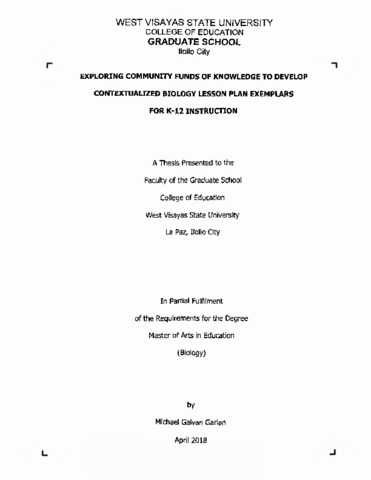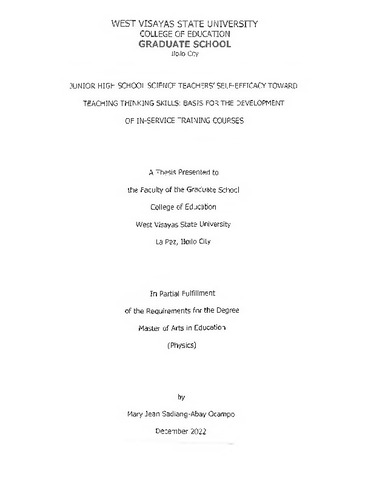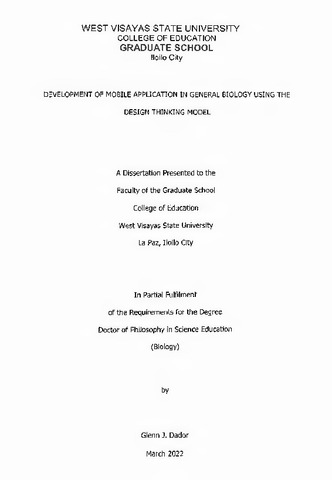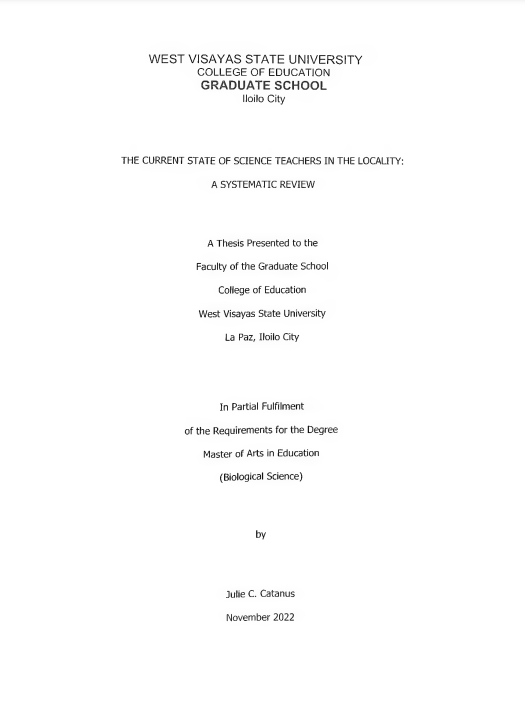Exploring community funds of knowledge to develop contextualized Biology lesson plan exemplars for K-12 instruction
Share
Zusammenfassung
Every community is an educational setting. Learners' context is an underdeveloped resource that can be tapped to create meaningful teaching-learning experiences. This hybrid study explored the coastal barangay and extracted funds of knowledge that existed within the various cultural practices of the community, drew out relevant biological concepts from these funds of knowledge congruent to K-12 curriculum, developed biology lesson plan exemplars anchored on the science competencies and according to the contextualization framework. These lesson plan exemplars were pilot tested to determine the perceptions of students and teachers regarding the context-based, situated instruction. Guided by the theoretical frameworks of constructivism and contextualization, the study made use of the tradition of action ethnography to study culture and extracted significant biological concepts from the community funds of knowledge through thematic analysis and memory banking. It also utilized descriptive survey to determine the perceptions of biology teachers and students regarding the contextualized lessons and lesson plan exemplars. Four cultural practices (a) pagpanginhas, (b) panalom, (c) pamawod, and (d) panguling carried out in the daily basis were explored and studied and two key informants for each cultural practice were interviewed at the coastal barangay of Guimaras. Seven exemplary contextualized lesson plans were developed covering topics in osmosis, components of ecosystem, biodiversity and taxonomy, energy transfer in ecosystem, carrying capacity and population growth and conservation biology. Thirty Grade 8 students of the rural high school nearest the coastal barangay served as the pilot testing participants and four biology teachers were tapped to utilize the developed contextualized lesson plan exemplars in their classroom instruction. The quantitative result revealed that students and teachers had positive and acceptable perceptions of the context-based, situated instruction. The study further showed how a contextualized classroom instruction based on the funds of knowledge that exist among the learners as part of the community to which they belong can create a transformative teaching-learning process that not only respects but also caters to the need of every learner. Lessons connected to the lived experiences of every learner enable him or her to appreciate and acknowledge that his/her subject has applications to his/her life as a worker, family member, and citizen and thus engages him/her in any activities that such learning requires. Thus, the science curriculum may be enriched with situated approaches to establish relevant and meaningful science education that relates to all learners and embraces not only their culture but also their individuality and applying contextualized lessons in biology pedagogy narrows the gap between classroom instruction and learner diversity, creating a more inclusive, situated, relevant science education that can last a lifetime.
Recommended Citation
Galvan, M. G. (2018). Exploring community funds of knowledge to develop contextualized biology lesson plan exemplars for k-12 instruction [Master’s thesis, West Visayas State University]. WVSU Institutional Repository and Electronic Dissertations and Theses PLUS.
Type
ThesisKeywords
Memory Banking Context-based Community funds of knowledge K-12 instruction Biology Lesson plan Exemplars K-12 Educational setting Instruction Learners' context Coastal barangay Extracted funds Science competencies Constructivism Perceptions Students Teachers Cultural practices Guimaras Ecosystem Population growth Conservation Lessons Teaching-learning classroom instruction Science curriculum Science education Trends in International Mathematics and Science Study TIMSS Scientific literacy National Achievement Test NAT Department of Education DepEd K-12 Basic Education Program culture National Indigenous Peoples' Education IPED K-12 curriculum Indigenous People IP Article XIV Section 14 of the 1987 Philippine Constitution R.A .10533 Enhanced Basic Education Act of 2013, Section 10.2 Biology education Contextual Learning Theory Pagpanginhas Picking sea shells Panalom Plunging into the Deep Pamawod Lining with the leaves Panguling Traditional Charcoal Making
Schlagwort
Degree Discipline
College of EducationDegree Name
Master of Arts in EducationDegree Level
MastersPhysical Description
x, 150 p. : ill. (col.).
Collections
- 2. Master's Theses [153]
Verwandte Dokumente
Anzeige der Dokumente mit ähnlichem Titel, Autor, Urheber und Thema.
-
Junior High School Science teachers' self-efficacy toward teaching thinking skills: Basis for the development of in-service training courses
Ocampo, Mary Jean S. (West Visayas State University, 2022-12)This descriptive-correlational study aimed to determine the relationship between Junior High School science teachers' self-efficacy and teaching thinking skills. The respondents were thirty-two (32) Junior High School ... -
Development of mobile application in General Biology using the design thinking model
Dador, Glenn J. (West Visayas State University, 2022-03)Learners of the future will demand the appropriate learning support for their situation or context, nothing more, nothing less. They want it at the moment. Not sooner, not later. Mobile devices will be a crucial technology ... -
The current state of Science teachers in the locality: A systematic review
Catanus, Julie C. (West Visayas State University, 2022-11)This systematic review aimed to determine the current state of science teachers in the locality. This includes science teachers' profiles, performance, practices, and predicaments. The researcher used interpretivism as the ...






